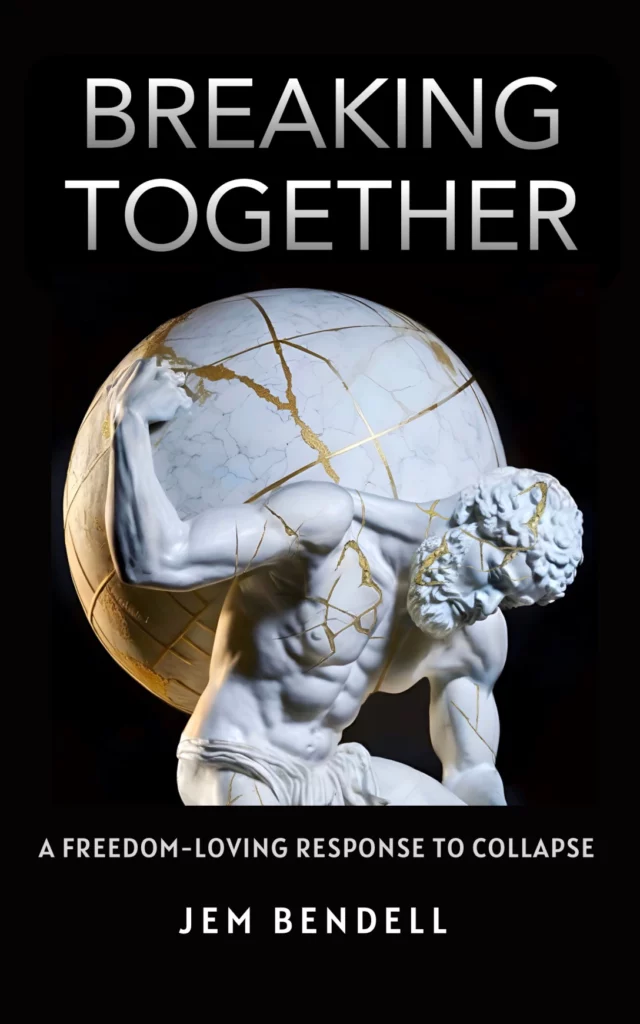Are we facing collapse, or merely huge disruption?
This is an important, useful book which should help you think more clearly about the future outlook, and about the complex systems that we all depend on (climate, economy, food supplies and more), which are all under stress and may change radically.
I’ve had some involvement with Jem Bendell and Deep Adaptation since late 2018, soon after he published his original paper, which is well worth re-reading. I admire Jem for his commitment to investigation, and for his courage to persist despite some vicious pushback. On the other hand, I disagree with some of his views.

Since 2018, Jem has insisted that societal collapse is inevitable within ten years, and I have regularly challenged him on this. The new book is intended to clarify and justify his claim. For me personally, I am still not convinced.
Jem defines collapse as follows: “I do not mean that it is a fast process, but that it is irreversible and cannot be recovered from in order for people to live their lifestyles as before.” To me, collapse means that crucial systems, such as money, food supply, public services, stop functioning altogether, and I doubt if this will happen. I believe severe disruption is a fairer statement, and this book did not validate Jem’s collapsist belief for me.
For example, Chapter 1 is titled Economic Collapse. The main indicators Jem cites are that the UN Human Development Index has been declining in most countries since 2019, and that “wages as a share of GDP have been falling in both richer and poorer countries for the last 40 years”. These trends indicate stress and declining quality of life, but surely not collapse…
One of the most useful insights I got from this book is its depiction of ‘Imperial Modernity’: “the interlocking set of political, economic and cultural systems that shape our everyday lives to favour the accumulation of power by elites”. Whilst he doesn’t believe covid was a conspiracy, he gives a valuable exposition of how covid was used to increase authoritarian control, manipulate public perceptions, and further enrich big business: all trends likely to increase as turbulence grows.
This book is also helpfully illuminating about the ways that Imperial Modernity is co-opting large parts of the scientific community and even environmentalists to support its views: for example, the claim that technology will fix the problems, and economic growth can be decoupled from fossil fuel use: plenty of research refutes these fantasy hopes. Jem also describes how the expression of the facts about the dire outlook, and debate about its implications, is largely excluded from social media and other channels.
Naturally, a book with chapters of gloom begs the question, ‘What can we do?’ Whilst Jem is right not to offer solutions, I found his chapter on responses a bit thin. They include developing alternative trading methods, e.g. local currencies, collective resilience planning, and community resilience projects. I have been looking over the past year for networks and resource guides to practical adaptation at local community scale, and have been surprised at their absence.
Jem is right to own how painful it is for him and many of his readers to accept that there is no solution, no way out, for this awful, deteriorating situation. His title urges us to explore breaking together, not apart, and it’s a pity that the book offers so few pointers on how to do this for ‘normal’ people. He mentions ecovillages as a role model, but these are not a reproducible, scalable approach. He profiles two impressive women: one is the co-founder of Extinction Rebellion, the other chose to emigrate to Guatemala to explore shamanism. Again, hardly people most of us can emulate.
So I’m going to offer brief pointers on some ways that we can adapt together, using Jem’s 4Rs as a framework.
Resilience: upgrade local halls as hubs, with backup power and soup kitchen capability. Community market gardens, local support groups.
Relinquishment: of our sense of entitlement, our expectations of a comfortable standard of living, of using airplanes, of living very autonomously.
Restoration: of neighbourhoods (street-scale, hamlet-scale), of self-sufficiency skills in repairing and bodging, in local food production and trading.
Reconciliation: acknowledge we’re all in this breakdown together, and lay aside divisions about Brexit, covid, and more. We may need to learn deeper listening and conflict-handling skills to do this.
It may not surprise you that I found this a difficult read: that’s not just because of its length or the gloomy outlook it depicts. It’s also frustrating to have a series of chapters with Collapse in the title, which largely fail to lay out the potential drivers for collapse, and the ways in which a collapse could actually come to pass.
One reason I diverge from Jem’s forecast of collapse is because of the stupendous power of the dominant system. Many smart observers thought the 2008 banking crisis meant collapse, and many thought covid would bring it: but we can see that the system uses turmoil to sustain itself and expand its power. So the outlook is depressing in terms of even greater injustice, even more authoritarian control and manipulation of reality. My best hope is that small pockets of local communities can survive with basic food production and minimising their dependencies on industrial consumer society.
